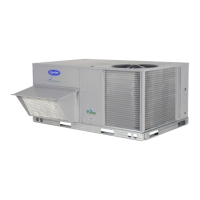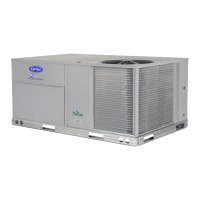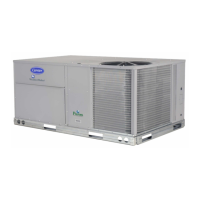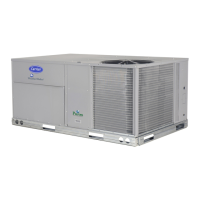104
Table 85 — Humidi-MiZer
®
Service Analysis
PROBLEM CAUSE REMEDY
Subcooling Mode Will Not Activate
Circuit B compressors unavailable Check alarm history for general cooling mode operation problems. See
Table 84.
Check for Circuit B compressors locked out.
General Cooling Mode problem See Table 84.
Humidi-MiZer relative humidity sensor not
functioning - RARH, SPRH, or field-installed
RH sensor
Check that a relative humidity sensor is connected and that the appropriate
sensor is configured in the unit software, (Configuration
DEHU
D.SEN).
See page 91.
Check for 24VDC from CEM (RARH, SPRH).
Check 4-20 ma signal from sensor.
Humidi-MiZer temperature sensors not func-
tioning - SAT, CCT
See “Thermistor Troubleshooting,” see page 102.
No Dehumidification demand See “No Dehumidification Demand, below.
3-way valve malfunction See “3-Way Valve Malfunction,” below.
Unit control software is not configured for
Humidi-MiZer system
Check that the unit is configured for Humidi-MiZer (Configura-
tion
DEHU
D.SEL).
Reheat Mode Will Not Activate
Circuit B compressors unavailable Check alarm history for general cooling mode operation problems. See
Table 84.
Check for Circuit B compressors locked out.
Humidi-MiZer relative humidity sensor not
functioning - RARH, SPRH, or field-installed
RH sensor
Check that a relative humidity sensor is connected and that the appropriate
sensor is configured in the unit software, (Configuration
DEHU
D.SEN).
See page 91.
Check for 24 VDC from CEM (RARH, SPRH).
Check 4-20 mA signal from sensor.
No Dehumidification demand See “No Dehumidification Demand,” below.
3-way valve malfunction See “3-Way Valve Malfunction,” below.
Unit control software is not configured for
Humidi-MiZer system
Check that the unit is configured for Humidi-MiZer (Configuration
DEHU
D.SEL).
No Dehumidification Demand
Relative Humidity setpoint is too low - discrete
input (Humidistat, Thermidistat, etc.)
Check/reduce setting on discrete humidity input device.
Relative Humidity setpoint is too low - RH sen-
sor
Check the dehumidification relative humidity trip point (Configura-
tion
DEHU
D.RH.S)
Software configuration error for the type of rel-
ative humidity sensor being used
Check that the unit software is configured for the correct relative humidity sen-
sor (Configuration
DEHU
D.SEN). D.SEN = 1: RARH, 2:SPRH, 3: Discrete
Input. See page 91.
No humidity signal Check wiring and sensor.
3-Way Valve Malfunction
No 24V signal to input terminals Check using Service Test mode.
Check wiring.
Check transformer and circuit breakers.
Check RCB relay output.
Solenoid coil burnout Check continuous over-voltage is less than 10%.
Check continuous under-voltage is less than 15%.
Check for missing coil assembly parts.
Replace solenoid coil.
Stuck valve Replace valve. Replace filter drier.
Unit Initiates a Humidi-mizer Reheat
Mode, but Supply Air Temperature is
Overheating/Overcooling the Space
Humid-MiZer Vent Reheat Set Point is too low Check the Vent Reheat Set Point Selection (Configuration
DEHU
D.V.CF)
and Vent Reheat Setpoint (Configuration
DEHU
D.V.HT). If used, check
the Vent Reheat RAT Offset also (Configuration
DEHU
D.V.RA). See
page 90 for Humid-MiZer controls set-up.
Evaporator discharge temperature (CCT) or
Supply air temperature (SAT) thermistor is
reading incorrectly.
See “Thermistor Troubleshooting,” page 102.
Check if SAT thermistor is in a location that is measuring stratified air.
Valve controlling gas bypass around the con-
denser is not functioning properly
See “Modulating Valves Not Functioning Properly.”
Valve controlling refrigerant flow to the con-
denser is not functioning properly
See “Modulating Valves Not Functioning Properly.”
Modulating valves are not calibrated properly Run valve calibration through Service Test.
Unit control software indicates a Humidi-MiZer
Reheat Mode, but the 3-way valve is not func-
tioning properly
See “3-Way Valve Malfunction.”
Unit is not sized to meet load at the current
entering air and outdoor conditions.
Check product data tables or ECAT for rated capacity at current entering air
and outdoor conditions.
Unit Initiates a Humidi-MiZer
Dehumidification Mode, but Supply Air
Temperature is Overheating/
Overcooling the Space
Supply air setpoint for cooling is too high/low Check the unit supply air set point for cooling operation. This is the temperature
that the valves will modulate to meet during a dehumidification mode.
Evaporator discharge temperature (CCT) or
supply air temperature (SAT) thermistor is
reading incorrectly.
See “Thermistor Troubleshooting” on page 102.
Check if SAT thermistor is in a location that is measuring stratified air.
Valve controlling gas bypass around the con-
denser is not functioning
properly
See “Modulating Valves Not Functioning Properly.”
Valve controlling refrigerant flow to the con-
denser is not functioning properly
See “Modulating Valves Not Functioning Properly.”
Modulating valves are not calibrated properly See “Modulating Valves Not Functioning Properly.”
Unit control software indicates a Humidi-MiZer
Reheat Mode, but the 3-way valve is not func-
tioning properly
See “3-Way Valve Malfunction.”
Unit is not sized to meet the load at the current
entering air and outdoor
conditions.
Check product data tables or ECAT for rated capacity at current entering air
and outdoor conditions.
Low Sensible Capacity in Normal
Cooling Mode
Valve controlling gas bypass around the con-
denser is stuck in an open position or leaking
See “Modulating Valves Not Functioning Properly.”
Valve controlling refrigerant flow to the con-
denser is stuck in a position less than 100%
open
See “Modulating Valves Not Functioning Properly.”
General cooling mode problem See Table 84.
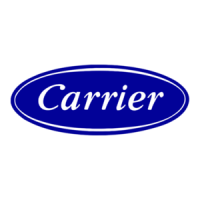
